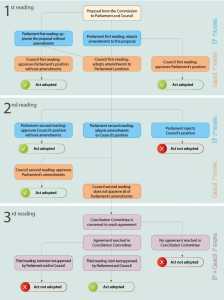The European Parliament shares legislative power with the Council of Ministers. Depending on the areas involved and the adoption procedures used the European Parliament has a relatively important role to play in the decision-making process.
As the treaties have progressed the European Parliament has seen its role as “co-legislator“, increase, notably via the co-decision procedure which does not apply to all domains however since some still depend on a unanimous vote on the part of the Council.
Contrary to a traditional parliament the European Parliament does not have the right to legislative initiative the monopoly of which lies with the European Commission. It can however suggest to the European Commission to make proposals with regard to legislative acts.
Since the Lisbon Treaty, there has been an ordinary legislative procedure and two special legislative procedures.
Codecision (ordinary legislative procedure)
Established by the Maastricht Treaty (1992), the co-decision procedure enables the joint adoption, by both the Council of Ministers and the European Parliament, of a legislative proposal. The proposal can be read twice in each institution; if there is disagreement a conciliation committee is formed of Parliament and Council representatives who meet to try and find a compromise.
The Lisbon Treaty turned this procedure into the procedure of common law, now renamed “ordinary legislative procedure”. The Parliament has become a true co-legislator. The other procedures have become derogatory legislative procedures, or special procedures in which the relationship between the two “houses” in imbalanced. The Lisbon Treaty doubled the number of legal bases subject to the co-decision procedure in areas as sensitive has the common agricultural policy or policies regarding border control, asylum and immigration. The legislative powers of the European Parliament also affect the control of people on borders, measures governing the reception and processing of asylum seekers and the fight to counter illegal immigration.

